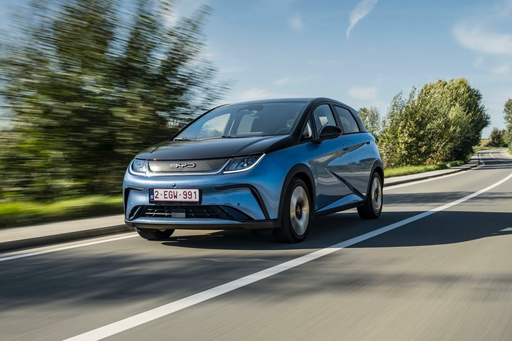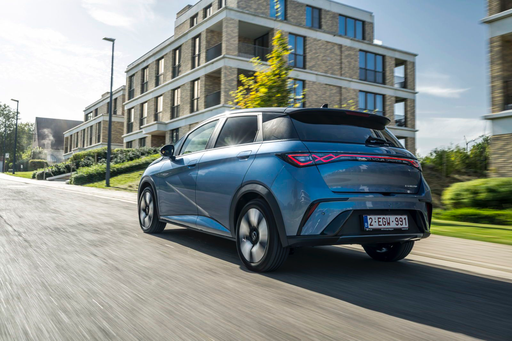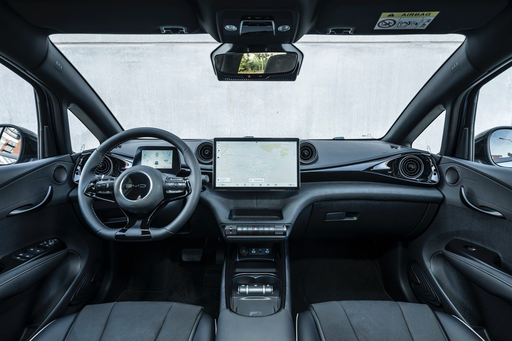BYD Dolphin vs Hyundai Kona – Differences & prices compared
Both models have their strengths – but which one suits you more?
Compare performance, efficiency, price and space directly: BYD Dolphin or Hyundai Kona?
Costs and Efficiency:
Looking at overall running costs, both models reveal some interesting differences in everyday economy.
Hyundai Kona has a distinct advantage in terms of price – it starts at 23100 £, while the BYD Dolphin costs 29700 £. That’s a price difference of around 6634 £.
In terms of energy consumption, the advantage goes to the Hyundai Kona: with 14.60 kWh per 100 km, it’s hardly perceptible more efficient than the BYD Dolphin with 15.90 kWh. That’s a difference of about 1.30 kWh.
As for range, the Hyundai Kona performs somewhat better – achieving up to 514 km, about 87 km more than the BYD Dolphin.
Engine and Performance:
Power, torque and acceleration are the classic benchmarks for car enthusiasts – and here, some clear differences start to show.
When it comes to engine power, the Hyundai Kona has a slight edge – offering 218 HP compared to 204 HP. That’s roughly 14 HP more horsepower.
In acceleration from 0 to 100 km/h, the BYD Dolphin is a bit quicker – completing the sprint in 7 s, while the Hyundai Kona takes 7.80 s. That’s about 0.80 s faster.
In terms of top speed, the Hyundai Kona performs distinct better – reaching 210 km/h, while the BYD Dolphin tops out at 160 km/h. The difference is around 50 km/h.
There’s also a difference in torque: BYD Dolphin pulls to a small extent stronger with 310 Nm compared to 265 Nm. That’s about 45 Nm difference.
Space and Everyday Use:
Cabin size, boot volume and payload all play a role in everyday practicality. Here, comfort and flexibility make the difference.
Both vehicles offer seating for 5 people.
In curb weight, Hyundai Kona is evident lighter – 1370 kg compared to 1658 kg. The difference is around 288 kg.
In terms of boot space, the Hyundai Kona offers noticeable more room – 466 L compared to 345 L. That’s a difference of about 121 L.
In maximum load capacity, the BYD Dolphin performs minimal better – up to 1310 L, which is about 10 L more than the Hyundai Kona.
When it comes to payload, Hyundai Kona somewhat takes the win – 490 kg compared to 410 kg. That’s a difference of about 80 kg.
Who wins the race?
The Hyundai Kona proves to be dominates this comparison and therefore becomes our DriveDuel Champion!
Hyundai Kona is the better all-rounder in this comparison.
 @ Hyundai Motor Company
@ Hyundai Motor Company
Hyundai Kona
BYD Dolphin
The BYD Dolphin is a cheeky electric hatchback that blends playful styling with surprising practicality, making it a brilliant city companion for buyers who want modern tech without the showroom bravado. It’s comfy, efficient and easy to live with, and while it won’t blind you with supercar drama, it will quietly get the job done with plenty of character.
details @ BYD Auto / BYD Global Media
@ BYD Auto / BYD Global Media
 @ BYD Auto / BYD Global Media
@ BYD Auto / BYD Global Media
 @ BYD Auto / BYD Global Media
@ BYD Auto / BYD Global Media
Hyundai Kona
The Hyundai Kona wears its personality on the outside with bold styling and sprightly handling that turns city driving into something a little more fun than a commute. It blends practical space, modern tech and sensible running costs into a compact, stylish package — a smart pick if you want flair without paying luxury prices.
details @ Hyundai Motor Company
@ Hyundai Motor Company
 @ Hyundai Motor Company
@ Hyundai Motor Company
 @ Hyundai Motor Company
@ Hyundai Motor Company
 @ Hyundai Motor Company
@ Hyundai Motor Company
 @ BYD Auto / BYD Global Media
@ BYD Auto / BYD Global Media
|
 @ Hyundai Motor Company
@ Hyundai Motor Company
|
|
|
|
Costs and Consumption |
|
|---|---|
|
Price
29700 - 31400 £
|
Price
23100 - 41600 £
|
|
Consumption L/100km
-
|
Consumption L/100km
4.6 - 7 L
|
|
Consumption kWh/100km
15.90 kWh
|
Consumption kWh/100km
14.6 - 16.8 kWh
|
|
Electric Range
427 km
|
Electric Range
377 - 514 km
|
|
Battery Capacity
-
|
Battery Capacity
1.3 - 65.4 kWh
|
|
co2
0 g/km
|
co2
0 - 163 g/km
|
|
Fuel tank capacity
-
|
Fuel tank capacity
38 - 47 L
|
Dimensions and Body |
|
|---|---|
|
Body Type
Hatchback
|
Body Type
SUV
|
|
Seats
5
|
Seats
5
|
|
Doors
5
|
Doors
5
|
|
Curb weight
1658 kg
|
Curb weight
1370 - 1773 kg
|
|
Trunk capacity
345 L
|
Trunk capacity
466 L
|
|
Length
4290 mm
|
Length
4350 - 4385 mm
|
|
Width
1770 mm
|
Width
1825 mm
|
|
Height
1570 mm
|
Height
1580 - 1585 mm
|
|
Max trunk capacity
1310 L
|
Max trunk capacity
1300 L
|
|
Payload
410 kg
|
Payload
420 - 490 kg
|
Engine and Performance |
|
|---|---|
|
Engine Type
Electric
|
Engine Type
Electric, Petrol, Full Hybrid
|
|
Transmission
Automatic
|
Transmission
Automatic, Manuel
|
|
Transmission Detail
Reduction Gearbox
|
Transmission Detail
Reduction Gearbox, Manual Gearbox, Dual-Clutch Automatic
|
|
Drive Type
Front-Wheel Drive
|
Drive Type
Front-Wheel Drive, All-Wheel Drive
|
|
Power HP
204 HP
|
Power HP
115 - 218 HP
|
|
Acceleration 0-100km/h
7 s
|
Acceleration 0-100km/h
7.8 - 11.9 s
|
|
Max Speed
160 km/h
|
Max Speed
162 - 210 km/h
|
|
Torque
310 Nm
|
Torque
200 - 265 Nm
|
|
Number of Cylinders
-
|
Number of Cylinders
3 - 4
|
|
Power kW
150 kW
|
Power kW
85 - 160 kW
|
|
Engine capacity
-
|
Engine capacity
998 - 1598 cm3
|
General |
|
|---|---|
|
Model Year
2023
|
Model Year
2024 - 2025
|
|
CO2 Efficiency Class
A
|
CO2 Efficiency Class
A, D, C, E, F
|
|
Brand
BYD
|
Brand
Hyundai
|
What drivetrain options does the BYD Dolphin have?
The BYD Dolphin is offered with Front-Wheel Drive.
The prices and data displayed are estimates based on German list prices and may vary by country. This information is not legally binding.
